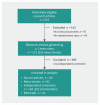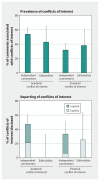Conflicts of interest and expertise of independent commenters in news stories about medical research
- PMID: 27993918
- PMCID: PMC5392116
- DOI: 10.1503/cmaj.160538
Conflicts of interest and expertise of independent commenters in news stories about medical research
Abstract
Background: Media coverage of medical research influences the views and behaviours of clinicians, scientists and members of the public. We examined how frequently commenters in news stories about medical research have relevant expertise and have academic and financial conflicts, how often such conflicts are reported and whether there are associations between the conflicts and the disposition of the comments toward the findings of the source research.
Methods: We analyzed 104 independent comments in news stories on original clinical research published in high-impact medical journals from Jan. 1 to Mar. 31, 2013, and 21 related journal editorials. Main outcomes were prevalence of relevant academic and clinical expertise, prevalence and reporting of academic and financial conflicts of interest, and disposition of comments toward study findings.
Results: Only 1 in 6 news stories included independent comments. Overall, 25% of commenters and 0% of editorialists had neither relevant academic nor clinical expertise (p = 0.007). Among the 104 comments, an academic conflict of interest was present for 56 (54%), of which 25 (45%) were reported in the news stories. A financial conflict of interest was present for 33 (32%) of the comments, of which 11 (33%) were reported. When commenters' conflicts of interest were congruent with the findings of the source research, 97% and 93% of comments associated with academic and financial conflicts of interest, respectively, were favourably disposed toward the research. These values were 16% and 17%, respectively, when the conflicts of interest were not congruent with the research findings.
Interpretation: Independent commenters in new stories about medical research may lack relevant academic or clinical expertise. Academic or financial conflicts of interest were frequently present among independent commenters but infrequently reported, and were often associated with the disposition of comments about the source research.
© 2017 Canadian Medical Association or its licensors.
Conflict of interest statement
Competing interests: Andrew Grey is a shareholder in Auckland Bone Density, a company that provides bone mineral density measurements. All of the authors have coauthored publications on the reporting and dissemination of clinical research findings. Andrew Grey and Mark Bolland have coauthored publications on conflicts of interest in the interpretation of clinical research findings.
Figures



Comment in
-
Improving coverage of medical research in a changing media environment.CMAJ. 2017 Apr 18;189(15):E551-E552. doi: 10.1503/cmaj.161206. Epub 2016 Dec 19. CMAJ. 2017. PMID: 27993923 Free PMC article. No abstract available.
References
-
- Thompson DF. Understanding financial conflicts of interest. N Engl J Med 1993; 329:573–6. - PubMed
-
- Bekelman JE, Li Y, Gross CP. Scope and impact of financial conflicts of interest in biomedical research: a systematic review. JAMA 2003;289:454–65. - PubMed
-
- Steinbrook R, Lo B. Medical journals and conflicts of interest. J Law Med Ethics 2012;40:488–99. - PubMed
-
- Vineis P, Saracci R. Conflicts of interest matter and awareness is needed. J Epidemiol Community Health 2015;69:1018–20. - PubMed
-
- Relman AS. Dealing with conflicts of interest. N Engl J Med 1984;310:1182–3. - PubMed
MeSH terms
LinkOut - more resources
Full Text Sources
Other Literature Sources
